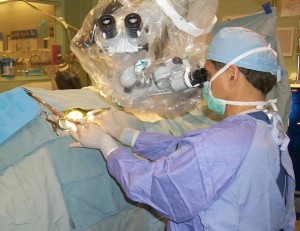Recognizing Signs and Symptoms of Dementia
 In a Series of Radio shows, Dr. Joseph Maroon’s colleague and physician assistant Jeff Bost PAC, presented information on Alzheimer’s disease and dementia related topics. In the series of radio shows are entitled, Healthy Living and Dementia Prevention. During this series Mr. Bost talks about the most common risk factors for dementia, what can be done to counter them and best ways to preserve brain function. The radio shows are sponsored by St Barnabas Health System (SBHS). Both Dr. Maroon and Mr. Bost are brain health advisors to SBHS.
In a Series of Radio shows, Dr. Joseph Maroon’s colleague and physician assistant Jeff Bost PAC, presented information on Alzheimer’s disease and dementia related topics. In the series of radio shows are entitled, Healthy Living and Dementia Prevention. During this series Mr. Bost talks about the most common risk factors for dementia, what can be done to counter them and best ways to preserve brain function. The radio shows are sponsored by St Barnabas Health System (SBHS). Both Dr. Maroon and Mr. Bost are brain health advisors to SBHS.
Session #3 – Recognizing Signs and Symptoms of Dementia
One of the most common signs of Alzheimer’s disease and other types of age-related dementia is forgetting recently learned information. This is referred to as short-term memory loss. Others include forgetting important dates or events, asking for the same questions over and over, and increasingly needing to rely on memory aids (e.g., reminder notes or electronic devices) or family members for things they used to handle on their own. But there are other less common signs and certain physical conditions and diseases can have similar symptoms and signs.
In this segment we will discuss the importance of differentiating dementia signs and symptoms from physical conditions and also when further evaluation and additional outside help may be needed. In addition, there will be information on what family and friends should know about home and personal safety for a person having cognitive decline.
Presenter – Jeff Bost PAC
Click HERE to Listen to Radio Interview Discussion for Session 1 (1/7/2021)
HIGHLIGHTS
10 Warning Signs of Alzheimer’s from the Alzheimer’s Association
- MEMORY LOSS THAT DISRUPTS DAILY LIFE. One of the most common signs of Alzheimer’s disease, especially in the early stage, is forgetting recently learned information. Others include forgetting important dates or events, asking the same question over and over again, or increasingly needing to rely on memory aids (e.g., reminder notes or electronic devices) or family members for things the person used to handle on their own.
- CHALLENGES IN PLANNING OR SOLVING PROBLEMS. Some people living with dementia may experience changes in their ability to develop and follow a plan or work with numbers. They may have trouble following a familiar recipe or keeping track of monthly bills. They may have difficulty concentrating and take much longer to do things than they did before.
- DIFFICULTY COMPLETING FAMILIAR TASKS. People living with Alzheimer’s disease often find it hard to complete routine tasks. Sometimes they may have trouble driving to a familiar location, organizing a grocery list or remembering the rules of a favorite game.
- CONFUSION WITH TIME OR PLACE. People living with Alzheimer’s can lose track of dates, seasons and the passage of time. They may have trouble understanding something if it is not happening immediately. Sometimes they may forget where they are or how they got there.
- TROUBLE UNDERSTANDING VISUAL IMAGES AND SPATIAL RELATIONSHIPS. For some people, vision problems are a sign of Alzheimer’s. They may also have problems judging distance and determining color or contrast, causing issues with driving.
- NEW PROBLEMS WITH WORDS IN SPEAKING OR WRITING. People living with Alzheimer’s may have trouble following or joining a conversation. They may stop in the middle of a conversation and have no idea how to continue, or repeat themselves. They may struggle with vocabulary, have trouble naming a familiar object or use the wrong name.
- MISPLACING THINGS AND LOSING THE ABILITY TO RETRACE STEPS. A person living with Alzheimer’s may put things in unusual places. They may lose things and be unable to go back over their steps to find them again. He or she may accuse others of stealing, especially as the disease progresses.
- DECREASED OR POOR JUDGMENT. Individuals may experience changes in judgment or decision-making. For example, they may use poor judgment when dealing with money, or pay less attention to grooming or keeping themselves clean.
- WITHDRAWAL FROM WORK OR SOCIAL ACTIVITIES. A person living with Alzheimer’s may experience changes in the ability to hold or follow a conversation. As a result, he or she may withdraw from hobbies, social activities or other engagements.
- CHANGES IN MOOD AND PERSONALITY. Individuals living with Alzheimer’s may experience mood and personality changes. They may be easily upset at home, at work, with friends or when out of their comfort zone.
Reference:https://www.alz.org/media/Documents/alzheimers-dementia-10-signs-worksheet.pdf
Disclaimer: Every effort has been made by the author(s) to provide accurate, up-to-date information. However, the medical knowledge base is dynamic and errors can occur. By using the information contained herein, the viewer willingly assumes all risks in connection with such use. Neither the josephmaroon.com website, the author, Beaver Radio, nor St Barnabas Health System or its affiliates shall be held responsible for errors, omissions in information herein nor liable for any special, consequential, or exemplary damages resulting, in whole or in part, from any viewer(s)’ use of or reliance upon, this material.
CLINICAL DISCLAIMER:
Clinical information is provided for educational purposes and not as a medical or professional service. Person(s) who are not medical professionals should have clinical information reviewed and interpreted or applied only by the appropriate health professional(s). (Read More HERE)




 Dr. Maroon received an athletic scholarship to Indiana University in Bloomington, Indiana where as an undergraduate, he was named a Scholastic All-American in football. Dr. Maroon has successfully maintained his personal athletic interests through participation in 9 marathons and more than 72 Olympic-distance triathlon events. However, his greatest athletic accomplishment is his participation in 8 Ironman triathlons (Hawaii – 1993, 2003, 2008, 2010, 2013; Canada – 1995; New Zealand – 1997; Germany – 2000), where he usually finishes in the top 10 of his age group. Recently, in July 2012 and 2013, he finished second and third, respectively, in his age group in the Muncie, Indiana half Ironman triathlon. In October 2013 he completed his 5th World Championship Ironman in Kona, Hawaii.
Dr. Maroon received an athletic scholarship to Indiana University in Bloomington, Indiana where as an undergraduate, he was named a Scholastic All-American in football. Dr. Maroon has successfully maintained his personal athletic interests through participation in 9 marathons and more than 72 Olympic-distance triathlon events. However, his greatest athletic accomplishment is his participation in 8 Ironman triathlons (Hawaii – 1993, 2003, 2008, 2010, 2013; Canada – 1995; New Zealand – 1997; Germany – 2000), where he usually finishes in the top 10 of his age group. Recently, in July 2012 and 2013, he finished second and third, respectively, in his age group in the Muncie, Indiana half Ironman triathlon. In October 2013 he completed his 5th World Championship Ironman in Kona, Hawaii.